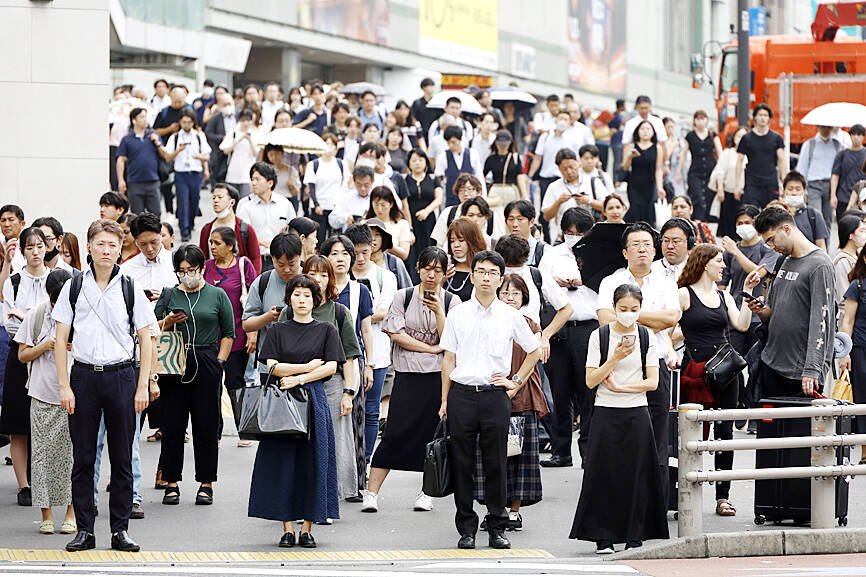The number of people in Japan aged 100 or older has hit a record high of more than 95,000, almost 90 percent of whom are women, government data showed yesterday.
The figures further highlight the slow-burning demographic crisis gripping the world’s fourth-biggest economy as its population ages and shrinks.
As of Sept. 1, Japan had 95,119 centenarians, up 2,980 year-on-year, with 83,958 of them women and 11,161 men, the Japanese Ministry of Health said in a statement.

Photo: EPA-EFE
On Sunday, separate government data showed that the number of over-65s has hit a record high of 36.25 million, accounting for 29.3 percent of Japan’s population.
The proportion puts Japan at the top of a list of 200 countries and regions with a population of more than 100,000 people, the Japanese Ministry of Internal Affairs and Communications said.
Japan is home to the world’s oldest living person, Tomiko Itooka, who was born on May 23, 1908, and is 116 years old, according to the US-based Gerontology Research Group.
The previous record-holder, Maria Branyas Morera, died last month in Spain at the age of 117.
Itooka lives in a nursing home in Ashiya, Hyogo Prefecture, the ministry said.
She often says “thank you” to the nursing home staff and expresses nostalgia about her hometown, the ministry said.
“I have no idea at all about what’s the secret of my long life,” Japan’s oldest man, Kiyotaka Mizuno, who is 110, told local media.
Mizuno, who lives in Iwata, Shizuoka Prefecture, with his family, gets up at 6:30am every morning and eats three meals a day — without being picky about his food.
His hobby is listening to live sports, including sumo wrestling, the ministry said.
Japan is facing a steadily worsening population crisis, as its expanding elderly population leads to soaring medical and welfare costs, with a shrinking labor force to pay for it.
The country’s overall population is 124 million, after declining by 595,000, government data showed.
The government has attempted to slow the decline and aging of its population without meaningful success, while gradually extending the retirement age — with 65 becoming the rule for all employers from fiscal 2025.

THE TRAGEDY OF PUNCH: Footage of the seven-month-old Japanese macaque has gone viral online after he was rejected by his mother and formed a bond with a soft toy A baby monkey in Japan has captured hearts around the world after videos of him being bullied by other monkeys and rejected by his mother went viral last week. Punch, a Japanese macaque, was born in July last year at Ichikawa City Zoo. He has drawn international attention after zookeepers gave him a stuffed orangutan toy after he was abandoned by his mother. Without maternal guidance to help him integrate, Punch has turned to the toy for comfort. He has been filmed multiple times being dragged and chased by older Japanese macaques inside the enclosure. Early clips showed him wandering alone with

Australian Prime Minister Anthony Albanese yesterday said he did not take his security for granted, after he was evacuated from his residence for several hours following a bomb threat sent to a Chinese dance group. Albanese was evacuated from his Canberra residence late on Tuesday following the threat, and returned a few hours later after nothing suspicious was found. The bomb scare was among several e-mails threatening Albanese sent to a representative of Shen Yun, a classical Chinese dance troupe banned in China that is due to perform in Australia this month, a spokesperson for the group said in a statement. The e-mail

South Korea would soon no longer be one of the few countries where Google Maps does not work properly, after its security-conscious government reversed a two-decade stance to approve the export of high-precision map data to overseas servers. The approval was made “on the condition that strict security requirements are met,” the South Korean Ministry of Land, Infrastructure and Transport said. Those conditions include blurring military and other sensitive security-related facilities, as well as restricting longitude and latitude coordinates for South Korean territory on products such as Google Maps and Google Earth, it said. The decision is expected to hurt Naver and Kakao

TENSIONS: The march went ahead without clashes, but arrests were still possible as police investigate suspects behind Nazi salutes, racist slurs and homophobic insults Thousands of people on Saturday marched in southeastern France under heavy security in tribute to a far-right activist whose killing, blamed on the hard left, has put the country on edge. The crowd — many wearing black and some covering their lower faces with masks — marched through the city of Lyon carrying flowers and placards bearing pictures of Quentin Deranque and the words: “justice for Quentin” and “the extreme left kills.” The 23-year-old died from head injuries following clashes between radical left and far-right supporters on the sidelines of a demonstration against a politician from the left-wing France Unbowed